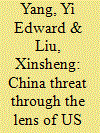| Srl | Item |
| 1 |
ID:
112835


|
|
|
|
|
| Publication |
2012.
|
| Summary/Abstract |
China scholars have examined the 'China threat' theory from various theoretical perspectives, offered a range of explanations for the theory's emergence and forecast the potential implications for US-China relations. However, few scholars have empirically studied the 'China threat' theory through the lens of the US media. This is a critical oversight, because the media plays a pivotal role in shaping US public opinion and US foreign policy, and the media is a key channel for 'China threat' dissemination and popularization. This study seeks to redress this oversight by empirically examining 'China threat' coverage in the US print media over a 15-year period from 1992 to 2006. We use content-analysis methodology to systematically collect, code and analyze 'China threat' data from five major US newspapers and to track the frequency and content of this coverage over time.
Our analysis reveals many interesting patterns in 'China threat' media coverage. First, the initial emergence of 'China threat' arguments in the US print media corresponded with the sharp upward turn in China's economic growth rates in the early 1990s. However, since the early 1990s, 'China threat' coverage has not mirrored China's steady growth. Rather, the media coverage was cyclic, featuring three key peaks (1996, 2000 and 2005) followed by subsequent declining interest. Second, our analysis reveals that the focus of these stories also varied over time. Perceptions of China as a political/ideological threat dominated media coverage in the earlier years (1992-1994) but steadily declined after 1995 and totally disappeared from the US print media after 2001. Perceptions of China as a military/strategic threat replaced political/ideological concerns in 1995, and the military focus has dominated media coverage ever since. Perceptions of China as an economic/trade threat persisted steadily throughout the 15-year time period with a clear uptick in recent years. We conclude this analysis by turning to the literature on realism, agenda setting and information processing to offer possible explanations for these empirical trends.
|
|
|
|
|
|
|
|
|
|
|
|
|
|
|
|
| 2 |
ID:
137524


|
|
|
|
|
| Summary/Abstract |
It is clear by now that China’s economy is set to slow in the years to come, although economists disagree about how much and for how long. Last year, the country’s GDP growth rate fell to 7.4 percent, the lowest in almost a quarter century, and many expect that figure to drop further in 2015. Plenty of countries struggle to grow at even this pace, but most don’t have to create hundreds of millions of jobs over the next decade, as China will. So understandably, some experts are skeptical about the country’s prospects.
|
|
|
|
|
|
|
|
|
|
|
|
|
|
|
|
| 3 |
ID:
144571


|
|
|
|
|
| Summary/Abstract |
The paradox that the performance of China’s stock market has not matched the performance of China’s real economy has been puzzling. This article argues that one of the major causes of the poor performance of China’s stock markets is that ever since their establishment, China’s stock markets have been systematically politicized by the ruling party to promote its political agenda. The mantra of ‘socialism’ of the ruling party has turned the stock markets into a mere fund-raising vehicle largely for failing state-owned enterprises, with investors’ interests being only a secondary consideration. The regulation of stock markets is subject to the principle of maintaining one-party ruling. Such a systematic politicization of stock markets has caused some serious consequences for China’s stock markets and economic growth.
|
|
|
|
|
|
|
|
|
|
|
|
|
|
|
|